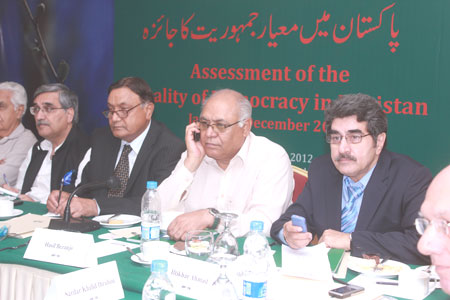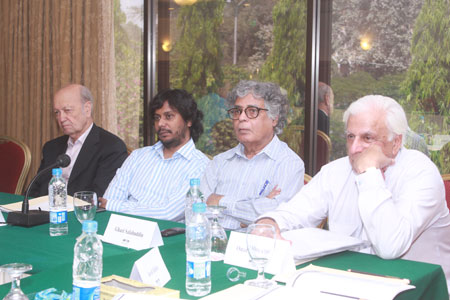|
|
| |
| EVENTS |
|
|
> Public Service Delivery Important to Improve Quality of Democracy
|
|
|
| |
April 16: PILDAT launched it reports on the �Assessment of Democracy� in Karachi, where representatives from the academia, media and civil society expressed their views. According to the report on the Assessment of the Quality of Democracy in Pakistan 2010-11, civil society and popular participation improved the prospect of democracy, while accountability of public officials remained low. |
|
| |
Dr. Ijaz Shafi Gillani, Chairman Gallup Pakistan, convening roundtable discussion, said that this is not an assessment of the government, but of different sections of political and civil society as a whole. He said that there was a consensus among political parties against military rule, which was a positive force for continuity of the democratic system. The absence of political support for any unconstitutional measures demonstrates maturity and evolution on part of political parties. Furthermore, the creation of an independent election commission through a bi-partisan process means that the process of democracy has a better chance of continuing to evolve with more fair and transparent elections in the future.
|
|
| |
Participants at the roundtable said that the quality of governance and delivery of basic services has sharply deteriorated in the past four years. In particular, the quality of education was a cause of concern for academics present at the event, who argued that access and quality of education was critical for the improvement of democracy in the country. A few participants at the roundtable discussion lauded the legislation concerning empowerment of women by the current parliament despite poor public services was rated as a positive force for marginalized sections of society. |
|
| |
Representatives of civil society at the Roundtable raised the issue of the exorbitant monetary cost of participation in elections. Despite the passage of the 20th Amendment, the flow of unaudited funds could hinder the prospects for free and fair elections in the future. Many participants expressed concern about the lingering serious flaws and inaccuracies in the new voters� lists and called for their early correction. It was considered imperative to improve the electoral process as shared by the participants at the Roundtable. |
|
| |
There was a consensus among political and civil society participants at the Roundtable that rule of law was critical towards improvement of the democratic system. This includes a non-political police force and conviction of criminals associated with terrorist activity. The state needs to build its capacity to enforce laws and provide justice to aggrieved groups. In addition, the civil-military imbalance could exacerbate the balance of democratic forces of power. |
|
| |
Mr. Shahid Hamid, former Governor Punjab, said that law and order situation in Balochistan and Karachi has been deteriorating. Poverty is also rising sharply in the country. There are no effective laws to hold public officials accountable as the National Accountability Commission Bill remains stuck at the National Assembly Standing Committee on Law and Justice for the last three and a half years. While there is reason to celebrate the independence of judiciary, role of media and improvement in electoral process, the rigorous process of democratic oversight was by no means robust. |
|
| |
A decent number of participants from across all section of the society including media, civil society and academia participated in the Roundtable Discussion. The participants included Ms. Mehar Marker Noshirwani, Shirkat Gah, Women's Resource Centre; Ms. Samina Qureshi, Assistant Professor of Mass Communication, University of Karachi, Mr. M. Asif Zuberi, Publisher Business Recorders and Chief Executive, , Aaj TV Karachi; Professor Dr. Akhter Baloch, Chairman, Department of Public Administration, University of Karachi; Ms. Shaheen Salauddin; Mr. Abdullah Khalid Hussain, President, Social Sector Support Service; Ms. Afia Salam, Editor, 24/7; Ms. Dilshad Zafar, Chairperson, Department of Commerce, University of Karachi, Maj. Gen. (Retd.) Muhammad Hassan Aqeel, Former Ambassador; Mr. Akhtar A. Hai, Senior Research Economist; Applied Research Centre; Syed Jamshed Bukhari, Reporter, Jang Group of Newspapers; Mr. Abdul Waheed Khan, Fellow, Bright Education Society; Rana Asif Habib, President, Initiator Development Foundation; Mr. Majid Ahmed, President, Gospel Help; Mr. Younus Bandhani, Director, Baanhn Beli; Syed Aamir Hameed, Department of International Relations, University of Karachi etc. |
|
| |
Members of the Democrat Assessment Group who were part of the Roundtable Discussion included Mr. Ilhai Bakhsh Soomro, Former Speaker, National Assembly of Pakistan, Mr. Shahid Hamid, Former Governor Punjab; Lt. Gen. (Retd.) Talat Masood, Defence Analyst; Lt. Gen. (Retd.) Moinuddin Haider, Former Governor Sindh / Former Federal Minister for Interior, Prof. Dr. Muhammad Waseem, Analyst and Academicians; Mr. Iftikhar Ahmed, Senior Journalist, Mr. Cyril Almeida, Analyst; Senator Mir Hasil Khan Bizenjo, Politicians; Mr. Javed Hafeez, Former Ambassador; Sardar Khalid Ibrahim, Politician, Mr. Javed Jabbar, Former Federal Minister for Media Development; Mr. Wazir Ahmed Jogezai, Former Deputy Speaker of the National Assembly of the Pakistan; Mr. Ahmed Bilal Mehboob, Executive Director of PILDAT and Ms. Aasiya Riaz, Joint Direct of PILDAT. |
|
| |
While concluding the discussion, Mr. Ahmed Bilal Mehboob, Executive Director of PILDAT thanked all the participants of the Roundtable Discussion as well as the cooperation and support of the Foundation for the Future (FFF) for this project. |
|
| |
|
|
| |

|
|
| |
|
|
| |

|
|
|
|
|
|
|
|
|